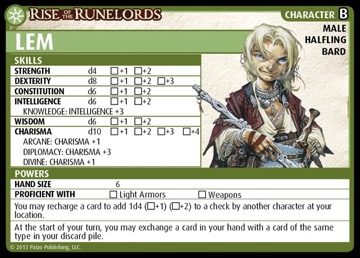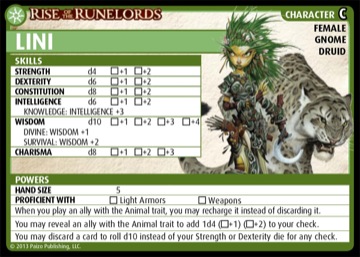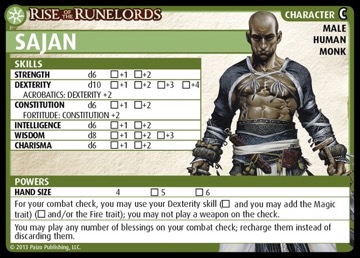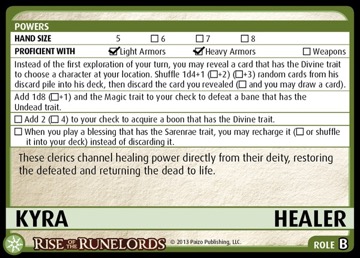 Eliandra Giltessan
Eliandra Giltessan
|
Rebel and I have definitely used some of these strategies before. The druid-bard wonder combo---Right off the bat Maznar was rolling 3d4 for a skill he DIDN'T have at the cost of Siwar recharging a card. We also played Feiya and Koren through PluTo---Koren reduced damage to Feiya, while Feiya shored up Koren's mediocre checks, which was definitely supporting weaknesses.
| Frencois |
Of course, character roles and complementary powers aren't the only thing to consider when putting together a party. There's a lot more, as the next article will discuss.
Maybe it'll be discussed later but complementary skills is the obvious next point. Obviously it's better to have one "melee" + one "range" character than both the same (same for "divine" and "arcane", or specific usage like "acrobatics" and "disable", and so on...). Note that there are a few skills that can really help many characters (like "diplomacy" for allies) where having it show up many times is less an issue.
| Hawkmoon269 |
One of my favorite groups was Sajan, Ezren, Amiri and Merisiel. The turn order always had Amiri taking her turn right before Merisiel so that she should could move others away from Merisiel. Ezren sometimes used Haste for that purpose too. It was very fun and felt great to be able to manipulate locations.
Some of these strategies become much more interesting in Organized Play. I played Radillo and had the power to where if an ally failed to acquire a boon I could banish a card to put that boon in my discard pile. I'd always try to acquire a card to have on hand for this power. The upgrade rules made it really worth it. I could say "Don't worry, even though Seelah has no chance of acquiring that deck 5 Ranged weapon, I'll just banish this deck B ally I picked up and we'll put that Ranged weapon in my discard pile. It will make a nice upgrade later."
| Mike Selinker Lone Shark Games |
| 1 person marked this as a favorite. |
Re the first caption: Lighters up.
| zeroth_hour2 |
Powers don't have to just support other power, they can support roles.
eg. Encounter redirection powers, like Siwar Manipulator, CD Valeros Daredevil and CD Oloch base's are very useful when combined with the right role, rather than a specific power. CD Valero and CD Oloch want to be with a support role, and Siwar Manipulator wants to be with a warrior that can attack without expending their attack cards.








